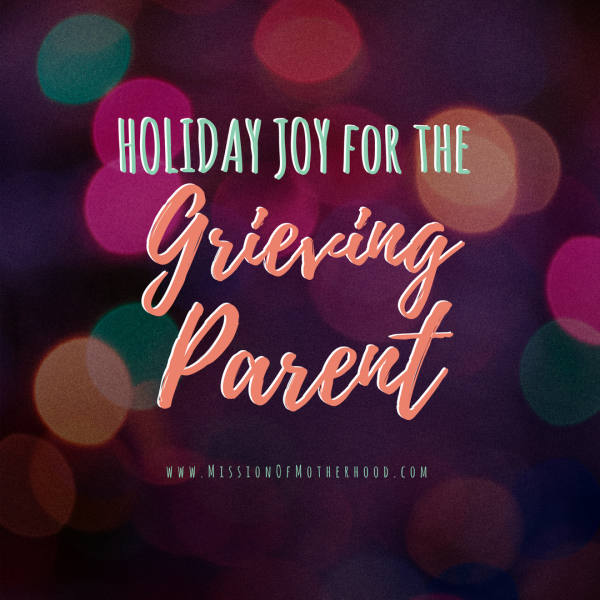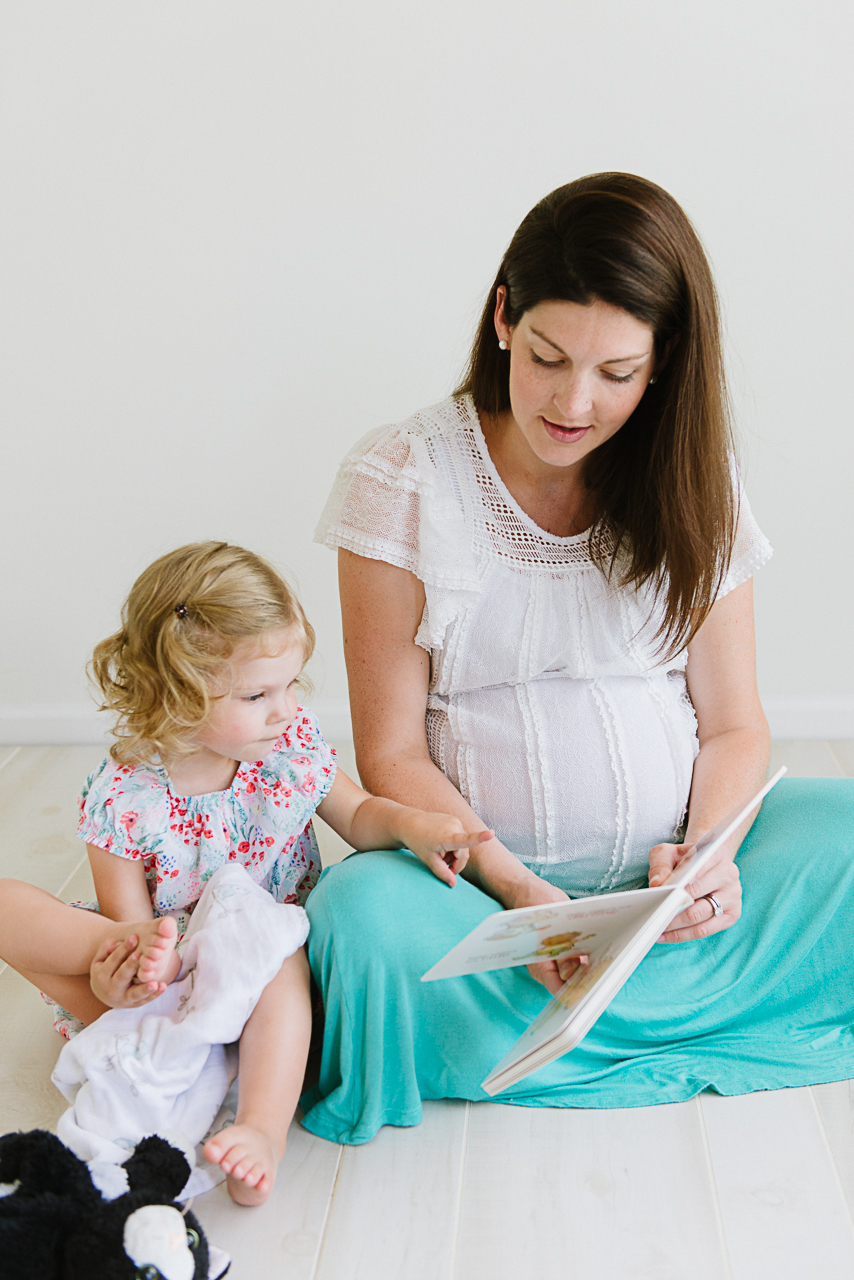The other night I had dinner with the sweetest couple whose son was stillborn in August. Their desire to show compassion to others, their new outlook on life in spite of their grief, and their growing love for each other were inspiring. My heart was heavy, yet full. I cried when I stood in his nursery, complete but never used for its intended purpose.
They are living my nightmare, yet they are more than surviving. They are healing, at their exact right pace, and they are doing it with grace. I intended to bless them with a meal and friendship, and in their tragedy, they ministered to me. Grief is funny that way.

This time of year is full of joy and merriment, celebrations, planning, and expectation. But if you’re grieving a loss, especially the loss of a child, this time of year can sometimes feel like a cruel joke. All this joy seems like mockery. Stockings and gifts and ornaments just point to an empty place in your house, an empty space in your heart.
If this is you, be encouraged that you’re not alone. And, that even when your pain feels like a gaping wound, at some point your wound will heal. You will make peace with your new normal and even, eventually — at your own, unique pace, in your own special way — you will find joy again.
For me, the frustrating thing this time of year is that celebrating my joy when I know others are struggling feels wrong. For those of us struggling with survivor’s guilt (that’s what I’ve chosen to call it, though I’m not sure this term is the best one for it), we can sometimes do more harm than good by avoiding the grief-stricken this time of year. If this is you, I would encourage you to reach out to your grieving friends.
As a culture, we are so ill-prepared to handle grief, loss, death, dying–and the death of a child is the most tragic of all. We hide, try not to talk about it, send flowers, and make ourselves scarce. We are afraid of reopening wounds by “reminding” parents. But here’s the thing I’m learning — they’re not going to forget their child any time soon. Remembering him with them can even be encouraging. Encouraging for us as survivors to learn how to cope and walk with our friends on this journey, and for the bereaved to know they are not alone; their loved one’s life was not in vain and will not be forgotten.
I remember the first Christmas I was pregnant, I was able to relate to Mary in the season of Advent (which means “coming, awaiting in expectation”) as an expectant mother. As a grieving parent, that part of the Christmas story (along with modern day “Baby’s First Christmas” gear, decorations, gifts, and milestones) was especially hard to wrap my mind around. However, as a Christian, the season of Advent in my grief was peacefully hopeful. This side of the Christmas story, Jesus has already come, and we await His return. In my grief, in my friends’ grief, I wait expectantly for His return where there will be no more tears, no more crying.
This hopeful expectation aspect of Advent is what I pray for my friends now; that in their grief they will know His true peace, and await His return with a joy that is beyond the circumstances of this temporary, and at times incredibly unfair, life on Earth.
In the meantime, here are some things I’ve found to help us during this season as we deal with our grief or the grief of those around us. In hopes of mending my own aching heart as I walk alongside my grieving friends during this time of year, I’m going to share some things I’m learning.
WHAT NOT TO DO/SAY:
Don’t just send flowers and let that be the end of it. Don’t abandon or forget about them in their grief.
Don’t tell them they’re going to get pregnant again soon. They don’t just want to be pregnant or have a baby, they wanted THIS baby.
Don’t say things like everything happens for a reason. Often we say this as Christians, and while I believe it’s true, in the throes of grief this is often a slap in the face rather than a source of comfort.
Don’t expect a response, and don’t encourage one. It’s ok if they don’t want to respond.
Don’t ignore them. Its hard, and we don’t like to feel uncomfortable, but grieving alone is no fun.
Don’t tell them their loved one is an angel in heaven. I know this is meant as a source of comfort, but we do not become angels when we die!
WHAT TO DO/SAY:
I love you. I’m thinking about you. I prayed for you today.
I’m sorry for your loss. Be a friend. Cry with them, grieve with them.
(Name) was a precious life, and I want to remember him/her with you. Talk about their baby, child, pregnancy, but let them set the pace. Don’t be afraid because you’re uncomfortable — goodness, you think its hard for YOU?! Imagine how much harder it is for them.
How will you be celebrating the holidays this year?
Make a meal. Don’t expect to be invited in to enjoy it. Bake it, pack it up in containers that don’t need to be returned, with ample ice packs, and leave it on their front porch. Food can be comforting both for the chef and the recipient, and the relief of not having to make small talk or cook when you’re grieving can be immense. Think easy reheat/prep, aluminum recyclable/disposable containers, and crockpot meals.
Drop off a bag of cookies.
How are you today? Each day is different, and some are good, some are bad. We don’t always know what’s going to trigger a fresh round of emotions for our friends, and we know everyone processes and heals from their grief at a different pace. Be a tortoise, not a hare: let them go slowly and don’t rush them.
WAYS TO SPREAD JOY IN YOUR OWN GRIEF:
Donate to an infant/pregnancy/child loss organization such as MEND, March of Dimes, and so on. Suffering spurs compassion, and compassion spurs action.
Donate to another charitable cause. See the needy as people, not burdens. Other charitable causes might include the homeless, refugees, social justice organizations, and so on. There is so much need in this world.
Adopt a family for the holidays in your area. Your local Chamber of Commerce, church, or county government can provide you some resources for this. Consider donations to local food banks, hospitals, and non-profits as well.
Adopt a child around the same age to buy gifts for this holiday season. If you previously lost a child, and s/he would’ve been 4 months this time of year, adopt a family with a 4-month old. If you lost a brother who was 19, find a family with a 19-year old, and so on. This might be extremely difficult the first time, and you may not be able to get through it without crying. You may not be able to put your heart into it–if all you can muster is a $25 Target gift card, let that be enough this year.
Make a meal for another hurting or needy family. If you are struggling to get through the hard days, then you know how valuable a frozen casserole can be. No questions asked, make a meal or cookies (or buy them!) and leave them on the front porch for another grieving family.
MORE RESOURCES:
http://empathhealth.org/thriving-grief-holidays/
Option B: Facing Adversity, Building Resilience, and Finding Joy
https://www.mend.org/get-support-1/
http://infantlossresources.org/
I know that grief comes in more ways than just the loss of a child or pregnancy, but this is the type of grief many of my friends are dealing with this time of year. Know that many of these causes, what to say, and what not to say resources can still apply if you or a loved one has lost a friend/sibling/parent, and not just lost a child.
Are you, or is someone close to you, grieving this holiday season? What ways have you found to bring joy back to this season? How did someone bless you in your time of need? Share in the comments.


